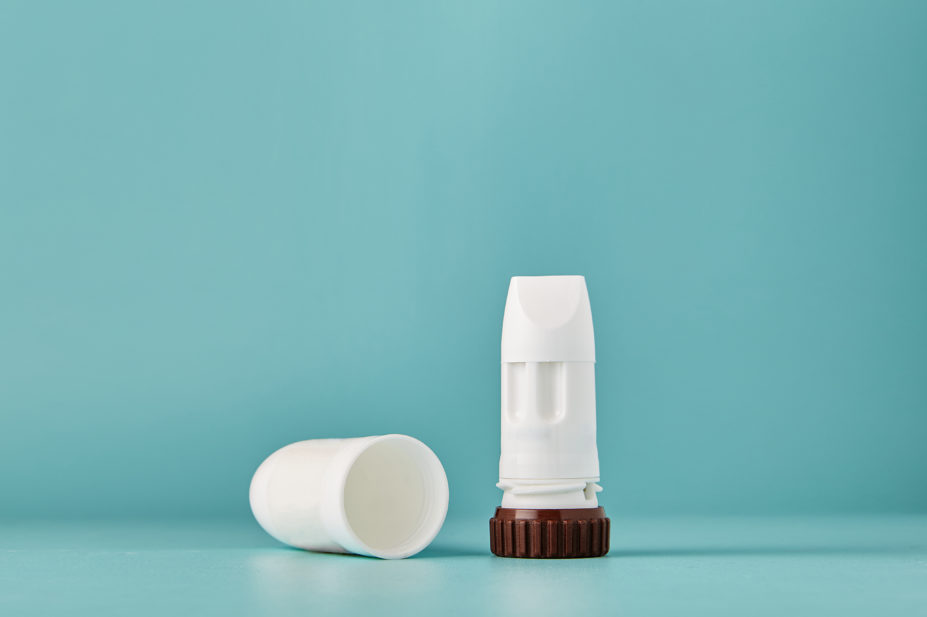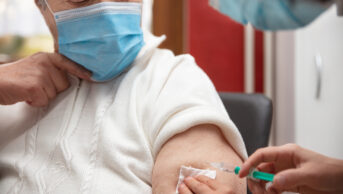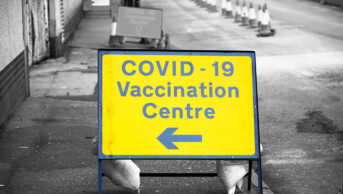
Shutterstock.com
Open access article
The Royal Pharmaceutical Society has made this article free to access in order to help healthcare professionals stay informed about an issue of national importance.
To learn more about coronavirus, please visit: https://www.rpharms.com/resources/pharmacy-guides/wuhan-novel-coronavirus
Budesonide has been found to shorten recovery time in COVID-19 patients aged over 50 years who are being treated in the community, according to interim findings from the Platform Randomised Trial of Interventions Against COVID-19 in Older People (PRINCIPLE).
According to the findings, early treatment with the inhaled corticosteroid shortened recovery time by a median of three days in patients with COVID-19 who were at higher risk of more severe illness, and were being treated at home and in other community settings.
Inhaled budesonide was added to the PRINCIPLE trial on 28 November 2020, but recruitment stopped on 31 March 2021 after the trial steering committee decided that enough patients had been enrolled to be able to establish if the drug had a meaningful benefit on time to recovery.
In total, 961 patients were randomly assigned to receive the drug at 800 micrograms, twice per day for 14 days, compared with 1,819 patients who were randomly assigned to receive the usual standard of NHS care only.
Interim analysis of results showed that the estimated median time to self-reported recovery for inhaled budesonide was 3.01 days shorter compared with usual care (95% Bayesian credible interval 1.134 to 5.410 days), with a high probability (0.999) of being superior to the usual standard of care.
Of those taking the drug, 32% of patients recovered within the first 14 days of being randomised and remained well for the following 28 days, compared with 22% in the usual care group.
Participants in the budesonide group also reported greater wellbeing after two weeks.
However, since fewer than expected people were admitted to hospital in the trial, and with COVID-19 cases and hospitalisations continuing to drop in the UK, the researchers said it was “not clear” from the interim analysis whether budesonide reduced hospitalisations.
“PRINCIPLE, the world’s largest platform trial of community-based treatments for COVID-19, has found evidence that a relatively cheap, widely available drug, with very few side effects, helps people at higher risk of worse outcomes from COVID-19 recover quicker, stay better once they feel recovered, and improves their wellbeing,” said Chris Butler, joint chief investigator of the trial.
“We therefore anticipate that medical practitioners around the world caring for people with COVID-19 in the community may wish to consider this evidence when making treatment decisions,” he added.
Mahendra Patel, pharmacy research and ethnic communities lead and co-investigator for the PRINCIPLE trial, said it was “great” to see the dedicated and hard work of his colleagues in the trial team “coming to fruition”.
“It’s great to see pharmacy being part of this hugely important work and with more new treatment arms added, pharmacy can continue to play a huge and vital role in the search for further and effective treatments,” he added.
The results follow the addition of favipiravir to the PRINCIPLE trial.
Favipiravir, which is licensed in Japan for the treatment of influenza, has become the first antiviral treatment to be investigated as part of the trial.
In a statement on 8 April 2021, the researchers said the drug had “shown positive results against SARS-CoV-2 in laboratory and animal studies, with small pilot studies in humans demonstrating some benefit in reducing symptoms and the duration of illness”.
Butler said the drug works by blocking “the complicated molecular dance that happens between a virus and our own cells when the virus is replicating”.
Paul Kellam, professor of virus genomics at Imperial College London, said that favipiravir was a drug that had been tested in clinical trials for use against influenza viruses and, from these, had a “known safety, tolerability and efficacy profile”.
“As with other antiviral drugs to treat respiratory virus infections, using the drugs early after infection to reduce virus replication, and thereby prevent more serious disease and shorten recovery time, can show clinical effectiveness,” he said.
However, Kellam said that this meant the drugs needed to be administered as close as possible to the time the person becomes infected and has a positive SARS-CoV-2 test.
The PRINCIPLE study is one of several nationally prioritised COVID-19 clinical trials in the UK and was the first clinical trial of potential COVID-19 treatments to take place in GP practices.
Full results from the budesonide arm of the PRINCIPLE trial will be published as soon as all remaining patients in the trial have completed their follow-up and a full analysis has been completed.
How might patients in the community receive COVID-19 medicines?
NHS Digital and NHS England have begun work on developing ways to distribute COVID-19 medicines to patients through primary care.
According to minutes from an NHS Digital meeting held on 31 March 2021, work is under way by NHS England to establish a service to deliver COVID-19 therapies directly through primary care to people who have tested positive for the virus.
The papers said the proposal for the service was approved on 12 March 2021 and “work is now underway to establish the enabling digital infrastructure”, including the ability to communicate potential eligibility for the therapies following a positive test, and enhancements to NHS 111 online to support patient identification and facilitate prescriptions.
“There are currently no therapies approved for treating COVID-19 outside of hospital,” the minutes said.
“This preparatory work is being initiated now to enable more rapid mobilisation of delivery channels as soon as novel therapies are approved for treatment of COVID-19 patients in primary care.”
READ MORE: Everything you need to know about the COVID-19 therapy trials


